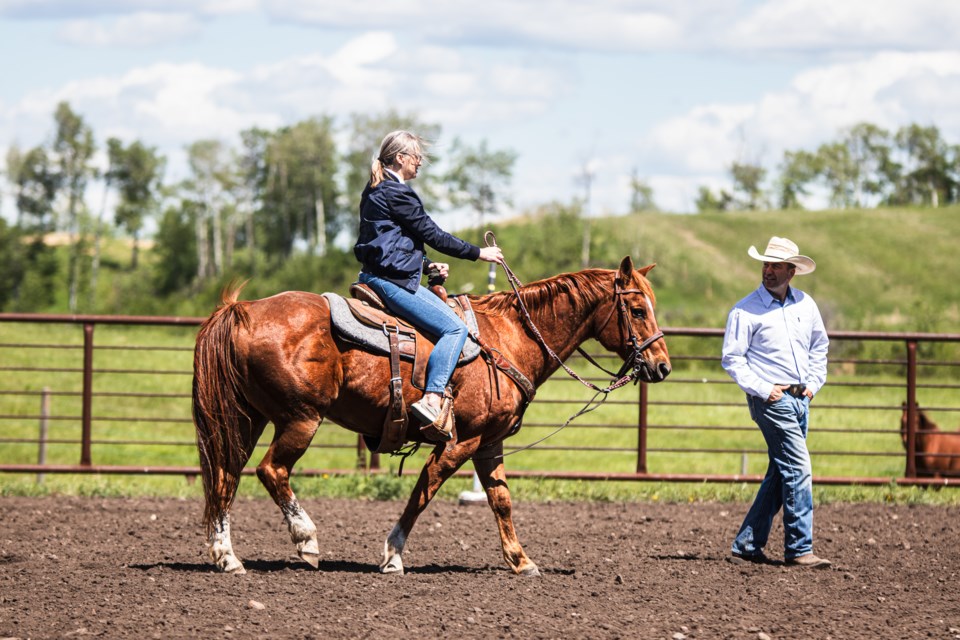LAKELAND – In a push to grow the tourism industry in the Lakeland region, economic development organizations connected entrepreneurs and businesses wanting to get into the tourism industry at an event held in St. Paul on Oct. 15.
Linda Sallstrom, Economic Development Officer (EDO) for the STEP Economic Development Alliance, said the goal was to help people understand tourism opportunities available in the Lakeland, and to provide information on resources that could support tourism-related initiatives.
STEP is the regional economic development partnership between County of St. Paul, Town of St. Paul, Town of Elk Point, and Summer Village of Horseshoe Bay.
Sallstrom noted that connections might include organizations like Travel Lakeland, Travel Alberta, Community Futures, or Portage College - who were all present during the evening.
Customer Service
Portage College provided information about its Super Host Foundations program, which involves teaching people how to “represent your brand or community,” said Joanne Parent-Metchooyeah, an associate dean at Portage College.
“How do you talk to investors or tourists? And how do you promote the area?” These are just some of the questions the course covers, she explained. Anybody can reach out to the college to inquire about the program.
As far as tourism goes, proper servicing in the hospitality industry is crucial, said Parent-Metchooyeah. And to compete with other regions in tourism and hospitality, “We have to up our game.”
“If I have a business, I’d want my staff to be trained . . . so that they can promote and represent me as well as the community,” offered Parent-Metchooyeah.
According to Sallstrom, many people in the Lakeland are interested in getting into tourism and some have already taken the first step.
The other goal of the event is to “understand what stage everybody was at and who they needed to connect with,” added Sallstrom.
Tourism opportunities in the Lakeland
Chris Down, Travel Alberta’s destination development manager for the Lakeland, explained that entrepreneurs have different needs. Some people are looking for resources to develop a business plan, and some are interested in grants.
Tourism in the region is growing, according to Down. “We have great assets . . . from Canoe Circuit in Lac La Biche, the Iron Horse Trail,” and water activities in Cold Lake, he said.
Marianne Janke, executive director of Travel Lakeland, echoed the sentiment. Travel Lakeland DMO is the destination management organization for northeast Alberta.
Speaking from experience, Janke said she has been involved with tradeshows in the province for many years, including the Edmonton Boat and Sportsmen's Show, and tradeshows in Sherwood Park and Fort McMurray.
Janke says she has noticed a shift in people wanting to visit the area, bring their families here, and stay for two weeks at a time.
“They’re looking for things like, ‘Can we go horseback riding? . . . Rent a canoe? Can we go paddling on the North Saskatchewan River? Where can I go fishing?’ All these questions.”
Ultimately, “They’re looking for more adventure,” and offering the right products “levels up our region.”
In addition to promoting the already existing products, there are opportunities for more, she said.
Janke explained that multiple groups, including Travel Lakeland, are working together to help businesses that may be looking to build something from the ground up, and helping existing tourism businesses that are wanting to add more to their business.
“We had some great entrepreneurs come in this evening and chat with us about their ideas . . . looking for starting points,” said Janke. “And we’re trying to identify what resources they need to help them.”
Tourism development zone
When the Lakeland was designated by Travel Alberta as one of its 10 tourism development zones in 2022, there was a shift to helping businesses develop their products. “[Travel Lakeland] has been working side-by-side with [Travel Alberta],” said Janke.
A shift to helping with product development means more active opportunities to grow the region.
For example, Travel Lakeland worked with Water Spirit Spa & Retreats Inc., based in Frog Lake, to help develop their business.
Travel Lakeland, the STEP Alliance, and Parallèle Alberta also worked together to help St. Paul-based agri-tourism destination River Ranch become a tourism destination in the Lakeland.
RELATED: New agri-tourism location near St. Paul has a heart for people and agriculture
"There's a number of other ones that we’re working with right now,” said Janke, adding Travel Lakeland did an asset inventory of the region, and has identified lists of tourism businesses to work with.
“[With] our project manager, Michelle Wright, we have a list identified, and we've been making contacts.”
Ideas include potentially building a network of e-bikes along the Iron Horse Trail, which may also involve multiple businesses or groups working together to develop a purchasable product package for people.
“So, sometimes, it’s not necessarily about one person building everything,” she said. There is also the possibility of having different businesses who have similar offerings, working with each other.
“Those kinds of connections are amazing,” said Janke.
Think regionally
And building connections and collaboration is important, said Down.
When looking at economic or tourism development, it can be challenging when municipalities focus strictly within their geographic boundaries.
“You want to think regionally,” to reflect diversity, said Down.
This is why Travel Alberta changed its boundary mapping from six regions to 13 in 2022. The areas are called Tourism Development Zones (TDZ). It allows for better collaboration between stakeholders, operations, and communities.
Down said the Lakeland TDZ has high potential of contributing to Alberta's goal of doubling its tourism revenue to $25 billion by 2035.
There are already businesses planning to delve into tourism, like Ranchland Outfitters based in Elk Point, who is building an accommodation facility that could be activated throughout the year.
“These are pretty big investments that some people are making in the region,” said Down.
Some rural areas in the province are also starting to see a reverse in population loss, which is encouraging for the tourism industry.



